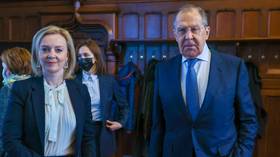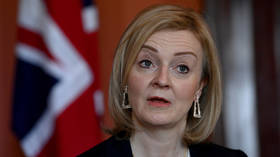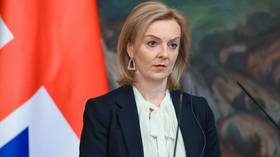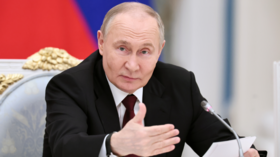Thatcher tribute act falls flat in Moscow

Instead of well-informed diplomatic give-and-take, Western foreign policy towards Russia too often takes the form of ignorant grandstanding and threats. As British Foreign Secretary Liz Truss’s trip to Moscow earlier this week has shown, this approach is both unsuccessful and irresponsible.
In Moscow on Thursday for talks with her Russian counterpart Sergey Lavrov, London’s top diplomat demanded that Russia withdraw the troops it has allegedly assembled near the Ukrainian border. Lavrov objected. The troops were on Russian territory, in the Rostov and Voronezh provinces, he said. It was not for the UK to tell Russia what to do on its own soil.
Truss was insistent. Russia must withdraw, she repeated. At this point, according to the newspaper Kommersant, Lavrov asked her, “do you recognize Russia’s sovereignty over Rostov and Voronezh provinces?” “Great Britain will never recognize Russian sovereignty over those regions,” Truss replied instinctively.
Clearly, the British foreign secretary had confused Rostov and Voronezh with the rebel provinces of Donetsk and Lugansk in Ukraine. An innocent enough slip, one might say. But it’s hardly the first time that Russians have found themselves laughing at Truss’s ignorance. In a speech in January, she declared that Russia had been invaded on many occasions, “from the Mongols to the Tatars.” The statement had people scratching their heads wondering what Truss thought the difference was.
At the start of February, Truss made another blunder, saying that the UK was “supplying and offering additional support into our Baltic allies across the Black Sea.” It is, I suppose, just about logistically possible. But to manage it, the British would have to sail through the Black Sea and then up the Don and Volga rivers to the Baltic, rather like the Vikings of old, but in reverse. Possible, but hardly practicable.
It seems like Russian history and geography aren’t the British minister’s strong point.
Fair enough, one might say – one can’t expect people to know everything. But it’s somewhat different when you’re negotiating about matters of war and peace. In such circumstances, gaffes like these suggest a lack of seriousness which is likely to result in a complete dismissal of everything one is saying.
It’s hardly surprising, therefore, that the talks between Truss and Lavrov did not go well, with the latter complaining that the former came to the meeting “unprepared,” and that it was like a conversation “of the mute with the deaf” – in other words completely pointless.
Making matters worse, the British side did not seem particularly interested in dialogue. Instead Truss used the opportunity to make demands about what Russia should do on its own territory, and to threaten sanctions against it if it does not comply. Instead of negotiations, there were “just slogans shouted from the tribunes,” Lavrov complained.
Unfortunately, this toxic combination of profound ignorance, sanctimonious moral superiority, and one-sided demands backed by threats has become commonplace in recent years. As Lavrov’s reaction shows, it is completely counter-productive, at least in terms of getting a positive response out of Russia. One wonders, therefore, what causes it.
A clue can perhaps be found in the long coat and hat Liz Truss wore while in Moscow. They bore more than a passing resemblance to the outfit worn by British Prime Minister Margaret Thatcher on a visit to the Soviet Union in 1987. And it’s not the first time Truss has channelled her inner Thatcher. An appearance in a tank in Estonia a few months ago had many commentators drawing parallels with an iconic photograph of the Iron Lady in a tank in 1986.
Cynics might well conclude that Truss is trying to portray herself as Thatcher 2.0, especially in circumstances where the position of current British Prime Minister Boris Johnson is looking a little shaky and the prospect of taking his job may be in many Conservative politicians’ minds. In short, it’s all about domestic politics.
The thing is, though, that it’s most unlikely that Margaret Thatcher would ever have allowed herself to make a gaffe like Truss’s. Thatcher was famously hard working and always on top of her brief. She made sure that she knew the facts before she opened her mouth. She was also open to discussion. Hosting Soviet leader Mikhail Gorbachev in Britain, she lectured him on the advantages of democracy, but at the same time listened to his defence of communism. Despite disagreeing entirely with one another, the two got on very well and learnt to trust each other. By contrast, today’s British politicians love to lecture, but don’t want to listen back.
The reason perhaps lies in the political incentives. Back in the 1980s, fears of global nuclear war were very genuine. The stakes in international diplomacy were very high. By contrast, today’s Western politicians know that what happens in Russia and Ukraine doesn’t actually matter very much to their own countries. Bothering to inform themselves of the realities of the situation isn’t worth the effort. Consequently, many prefer to remain “rationally ignorant.” If talks with Russia fail, the damage at home won’t be great. But playing hardball will sell well with the voters, allowing politicians to present themselves as “tough on Russia.” And so this is what they do. It is, of course, utterly irresponsible, but politically it makes sense.
The roots of this political irresponsibility, it seems to me, lie in the expectation of many Western leaders that they should take a prominent role in managing global affairs combined with their lack of power to do so. Without the means to achieve change, but wanting to be seen to be involved, politicians substitute tough rhetoric for real diplomacy. As a result, it’s hardly surprising that Russian leaders appear to have decided that the only people worth talking to are the Americans, since the latter, having the power to do things, also have to think a bit more responsibly about what they do.
No doubt, patriotic Brits will dismiss the mockery of Liz Truss’s Moscow debacle as “Russian propaganda.” But in reality, they ought to listen, for incompetent diplomacy of this sort serves Britain ill. A new approach is needed. Sadly, the political incentives are such that it’s unlikely to appear any time soon.
The statements, views and opinions expressed in this column are solely those of the author and do not necessarily represent those of RT.













